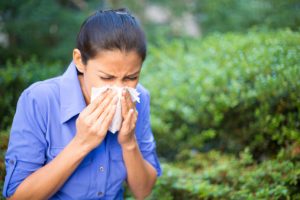
Pollen allergy is the most common springtime allergy, which occurs during blooming of plants. Although you can’t avoid pollen, you can take the appropriate steps to reduce your risk of allergy symptoms and outbreaks throughout the season.
Aside from pollen allergies, asthma sufferers also have a harder time in the spring, as pollen can trigger asthma attacks even if you’re not necessarily allergic to pollen. Joyce Rabbat, M.D., an assistant professor at Loyola Medicine, said, “Seasonal pollens in the spring can result in airway inflammation and worsen underlying asthma.”
Lastly, hay fever – or allergy rhinitis – is a combination of symptoms like runny nose, itchy eyes, and even a skin rash at times. Hay fever is caused when the body’s immune system overreacts to environmental triggers because it has become sensitized. Many individuals don’t develop a reaction to these triggers, but those with hay fever do.
There are two different types of hay fever: seasonal and perennial. Seasonal hay fever only occurs in certain seasons as it is triggered by the environmental changes that occur in that time period. Perennial hay fever causes symptoms all year round and can be a result of dust mites, cockroaches, dander, and even an underlying food allergy. In some cases, individuals will experience both types of hay fever. Symptoms worsen when perennial is combined with seasonal.
Seasonal hay fever treatment should be initiated prior to season, study shows
Research from the University of Oslo found that seasonal hay fever can be induced even when it is not pollen season, suggesting new means of treating the condition. The findings of the study indicate that treating seasonal hay fever prior to the allergy season can better help target allergen-specific T cells to reduce severity of seasonal hay fever.
Local T cells cause an inflammatory reaction during seasonal hay fever by producing cytokines, which activate immune cells. It has long been unknown whether T cells reside in the mucosa outside of the pollen season. The results of the study confirmed that allergen-specific T cells do reside in the mucosa outside of the pollen season and react quite strongly to pollen extract. The findings offer greater insight as to effective approaches to treating seasonal hay fever.
Manage allergies and asthma attacks
Some other tips to better control your asthma and allergies are:
- Avoid being outdoors when pollen is at its highest – news reports will often indicate this, but a good rule of thumb is trying to stay indoors between the hours of 5 am and 10 am.
- After being outdoors, shower or bathe and wash or change your clothes, as pollen can stick to the body.
- Dry your sheets and clothing indoors as opposed to hanging them outside.
- Use air conditioning instead of opening windows.
- Choose landscaping ground covers that don’t produce too much pollen– such as Irish moss.
- Keep grass short and ask someone else to do the gardening – or wear a mask.
- Work out indoors as opposed to outdoors, and if you are heading outside ensure you take your asthma medication.
Hay fever (rhinitis) prevention and treatment
Unfortunately, pollen cannot be avoided, and so it’s up to you to take precautions when dealing with the outdoors in order to better prevent hay fever. Some prevention tips of hay fever include:
- Using air conditioning and avoiding open windows and doors
- Avoiding fresh flowers in the house
- Vacuum-cleaning regularly
- Damping dust regularly
- Keeping pets outdoors and bathing them if they come in
- Not smoking or being around those who smoke
- Drying clothes indoors
- Avoiding outdoor activities during high pollen times
- Wearing wraparound sunglasses to avoid pollen in your eyes
- Showering soon after coming in from outdoors
If you are having a hay fever attack, there are many treatment options for you to utilize including:
- Nasal corticosteroids
- Antihistamines
- Decongestants
- Cromolyn sodium
- Leukotriene modifier
- Nasal ipratropium
- Oral corticosteroids
- Allergy shots
- Under-the-tongue allergy tablets
- Rinsing solutions for the nasal passageways
Speak to your doctor about your allergies, asthma, and hay fever in order to create a plan that best suits your needs.
Related Reading:
Natural ways to beat seasonal allergies
Tired of the congestion, itchy eyes, and fatigue that plagues you? Symptoms of seasonal allergies can really take the joy out of summer. While friends and relatives are attending barbecues and garden parties, you’re staying indoors, grumpy and sniffling. Continue reading…
Spring allergies? Natural solutions for dry eyes
We all love the feeling of warmer weather and the promise of summer months ahead, but sometimes the side effects of seasonal changes may make it less than enjoyable. Spring is a time for renewal and so the grass gets greener, the trees and flowers start to blossom, and the scenery of white and gray fades away. Continue reading…
Sources:
http://www.webmd.com/allergies/features/pollen-survival-guide
http://www.webmd.com/asthma/features/spring-asthma
http://acaai.org/allergies/types/hay-fever-rhinitis
http://www.everydayhealth.com/hs/allergy/most-common-spring-allergies/
https://www.sciencedaily.com/releases/2015/05/150504103421.htm
http://www.webmd.com/asthma/features/spring-asthma?page=2
http://www.nhs.uk/conditions/hay-fever/Pages/Prevention.aspx
http://www.mayoclinic.org/diseases-conditions/hay-fever/basics/treatment/con-20020827